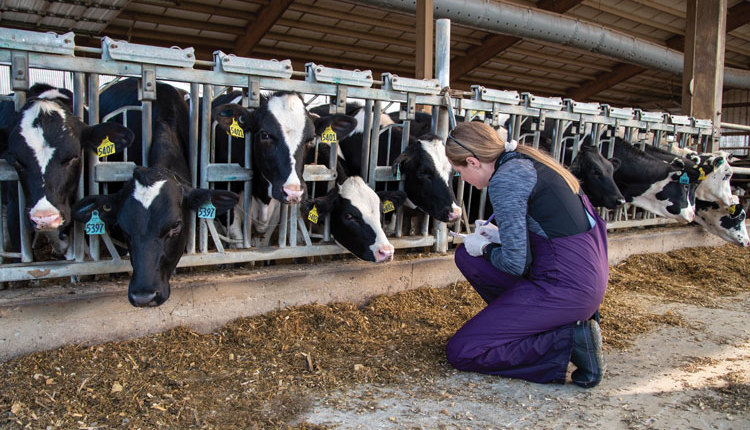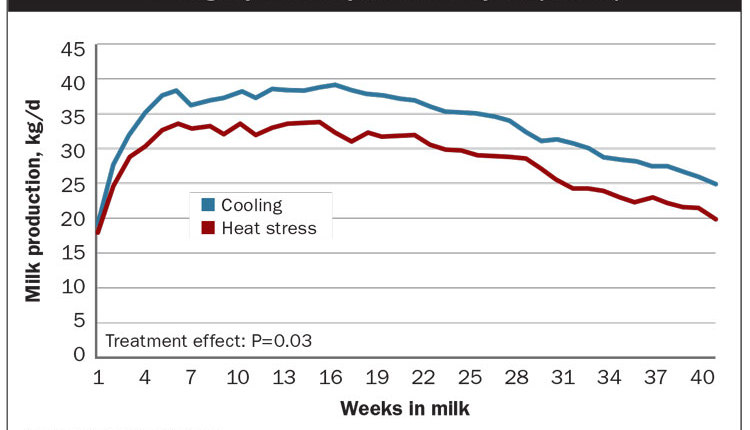The author is a dairy extension specialist at North Carolina State University, Raleigh.
Summer's heat and humidity are upon us. Are you ready to minimize summer stresses on your cows? Two main responses cows usually have to heat and humidity are to eat less feed and produce less milk. Another problem that often occurs with heat and humidity stress is an elevation in herd somatic cell count. Below are some suggestions for reducing these summer stress responses of your cows.
• Ask your nutritionist to check your rations for changes that will help maintain intake, milk production, or both. Also, check to be sure your cows are receiving adequate levels of vitamins A and E and selenium. These nutrients help promote a strong functioning immune system which is needed to combat udder-invading bacteria and elevating SCC values.
• Keep your cows as cool as possible so they don't congregate in wet, mucky areas where they will surely end up with dirty udders. Cooler cows usually have better functioning immune systems to combat udder-invading bacteria. Provide shade if the cows are on pasture or in an exercise lot. Install fans and water misters in your free stall barn alleys, parlor holding pen, and return alleys to cool the cows. In certain areas of the country, cooling ponds are used to cool cows, but proper maintenance of the ponds is required to keep them from becoming contributors to a problem rather than a solution.
• Keep udders as clean as possible so the number of bacteria the teat ends are exposed to is minimized. The cleanliness of the free stalls and alleys is very important for keeping udders clean, so the stall bedding material and the alleys may need to be cleaned at each milking.
• Consider using a different stall bedding that is less supportive of bacteria growth. Since the teat ends are exposed to bacteria as the cows are resting in the stalls, try to use a bedding material that does not support the growth of bacteria. Sand is the preferred bedding material for many people. If your waste handling system cannot handle sand, then use kiln-dried sawdust/shavings. Avoid green sawdust. Pine products are preferred to hardwood products. You may want to try adding a pH-altering product to the bedding material to slow the growth rate of bacteria in the bedding. Such products must be added every two to three days.
• Proper udder preparation at milking is critical to reducing/ preventing the introduction of bacteria into the udder during milking. The use of predips and postdips, proper wiping and drying of the teats when cleaning them, and minimizing the machine on-time all are very important in reducing the new cases of intramammary infections and in keeping the SCC value low. Barrier postmilking dips may be helpful in reducing environmental pathogen-caused infections.
While you may not be able to prevent the impact of summer's heat and humidity completely, there are practices that can reduce the economic impact.
Click here to return to the Animal Care E-Sources
09_07_468
Summer's heat and humidity are upon us. Are you ready to minimize summer stresses on your cows? Two main responses cows usually have to heat and humidity are to eat less feed and produce less milk. Another problem that often occurs with heat and humidity stress is an elevation in herd somatic cell count. Below are some suggestions for reducing these summer stress responses of your cows.
• Ask your nutritionist to check your rations for changes that will help maintain intake, milk production, or both. Also, check to be sure your cows are receiving adequate levels of vitamins A and E and selenium. These nutrients help promote a strong functioning immune system which is needed to combat udder-invading bacteria and elevating SCC values.
• Keep your cows as cool as possible so they don't congregate in wet, mucky areas where they will surely end up with dirty udders. Cooler cows usually have better functioning immune systems to combat udder-invading bacteria. Provide shade if the cows are on pasture or in an exercise lot. Install fans and water misters in your free stall barn alleys, parlor holding pen, and return alleys to cool the cows. In certain areas of the country, cooling ponds are used to cool cows, but proper maintenance of the ponds is required to keep them from becoming contributors to a problem rather than a solution.
• Keep udders as clean as possible so the number of bacteria the teat ends are exposed to is minimized. The cleanliness of the free stalls and alleys is very important for keeping udders clean, so the stall bedding material and the alleys may need to be cleaned at each milking.
• Consider using a different stall bedding that is less supportive of bacteria growth. Since the teat ends are exposed to bacteria as the cows are resting in the stalls, try to use a bedding material that does not support the growth of bacteria. Sand is the preferred bedding material for many people. If your waste handling system cannot handle sand, then use kiln-dried sawdust/shavings. Avoid green sawdust. Pine products are preferred to hardwood products. You may want to try adding a pH-altering product to the bedding material to slow the growth rate of bacteria in the bedding. Such products must be added every two to three days.
• Proper udder preparation at milking is critical to reducing/ preventing the introduction of bacteria into the udder during milking. The use of predips and postdips, proper wiping and drying of the teats when cleaning them, and minimizing the machine on-time all are very important in reducing the new cases of intramammary infections and in keeping the SCC value low. Barrier postmilking dips may be helpful in reducing environmental pathogen-caused infections.
While you may not be able to prevent the impact of summer's heat and humidity completely, there are practices that can reduce the economic impact.
09_07_468








